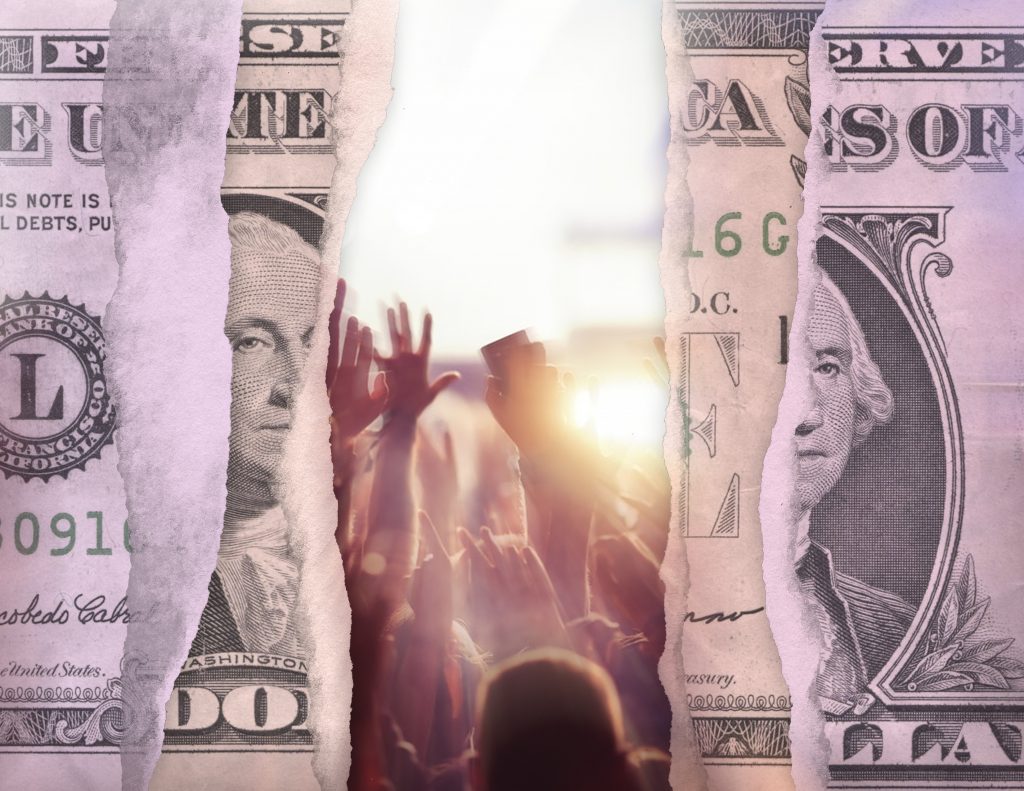Joe Villasana’s $641 vanished into the ether of the live entertainment industry.
He splurged for a ticket to see Rage Against the Machine at the 12,000-seat Don Haskins Center in El Paso, Texas, but the band’s reunion tour has since been postponed due to the COVID-19 pandemic. Villasana pleaded for a refund from two Ticketmaster representatives, but they thwarted his efforts. Instead, the pair ingrained in him their company’s new policy: “Ticketmaster cannot issue a refund until the concert is canceled.”
“$641 is a lot of money,” Villasana said. “I would rather have that money in my bank account instead of in limbo.”
Villasana is a victim of the struggle between fans and promoters that will scar the live music industry for years to come. Concertgoers like Villasana need their money back as 55 million Americans have filed for unemployment in the coronavirus’ wake. But internationally renowned arenas and ramshackle clubs must eschew refunds to keep the lights on while their seats are empty. If Ticketmaster and venue owners refund all the money they have earned from now-postponed shows, the live music industry could go bankrupt.
This dilemma has devastating repercussions. Live music is a $10 billion industry in America, entertaining over 100 million attendees every year and employing thousands of sound and lighting engineers, drivers and hospitality workers who operate in the shadows to make shows possible. It is also the primary source of income for musicians, as recorded and streamed music is more promotional than profitable.
As COVID-19 inundated the economy, ticket holders awaited automatic refunds. “I kind of assumed that’s what was going to happen,” Richard Perazzo said. He spent $560 for two tickets to Mega Mezcla, an annual concert over 17,000 people attend to celebrate Latino music, which has been rescheduled for August 29. Ticketmaster declared that they would begin offering refunds for postponed shows after May 1 as new dates are scheduled, but has not offered Perazzo his money back at this time.
John Breyault, a representative of the National Consumers League, advocates for the millions of ticket holders who expected returns as the pandemic loomed overhead.
“A company holding onto hundreds of thousands of dollars of consumers’ money is just completely unconscionable. We think the right way to go would be to provide refunds to consumers automatically, whether the show is canceled or postponed or rescheduled.”
Breyault staunchly opposes Ticketmaster, who reportedly updated its refund policy just as the economic repercussions of the pandemic started to unfold in the United States.
“Essentially what [these] companies are telling consumers is that they want consumers to float them a long term, no-interest loan with no date on when they should expect to be repaid, or for the service they paid for to be provided,” he said.
Ticketmaster’s claim that it will unveil refunds when new dates are set is a “half measure,” according to Breyault. He cites the current predicament of Taylor Swift fans as an example. “Taylor Swift has said she’s not going to tour until 2021, so for consumers that purchased tickets to her shows that are postponed, they’re still in the lurch. Ticketmaster is still holding onto their money because no dates have been set for the new shows yet.”
Their money idles in a complicated supply chain that merely begins with Ticketmaster. According to a press release from April 17, the company “send[s] money to event organizers on a weekly basis as tickets are sold.” Jared Smith, the president of Ticketmaster, explained, “we have already sent more than $2 billion to event organizers, making it impossible to issue refunds to fans before recouping sales receipts from the organizers, as we’ve done in the past.” In addition to organizers, money is dispersed to venues, management teams and, of course, the artists themselves.
Rick Eberle, a veteran promoter and club manager, suggests that refunds can only be determined by the venues due to rescheduling and accounting. “It all depends on the accounting for each particular venue,” he said. “Some may be able to very easily backtrack and give those refunds. [For] other ones, it may be more difficult to do that, especially for the Mom and Pops.”
If independent venues have to refund all their customers during a dry summer season, they may have to close up shop. “I don’t have any money to give them really, except when we go on sale and I sell new tickets,” Michael “Eppy” Epstein, a venue owner, said. He owns My Father’s Place, a small independent club of legend during the ’70s and ’80s that reopened in Roslyn, N.Y. in 2018.
Epstein runs a one-man customer service department from his home office and pleads with patrons to stand by My Father’s Place while he re-books three months of shows. He cajoles his customers and says he has retained 97% of his ticket sales through his efforts.
“If on the rescheduled dates you can’t make it cause you got to go to a bar mitzvah, or your grandchild’s birthday party, or your grandmother’s wake, then we’ll give you your money back,” he said. “But I’m not going to do that without coercing you or pleading with you to look at what else is on the website that you might want to see.”
A handful of venues, including Stony Brook University’s Staller Center for the Arts, canceled the remainder of their spring shows and automatically refunded ticket holders. Alan Inkles, the director of the Staller Center, described the decision as “the cleanest way to go” — but acknowledges that it was imperfect, and is not practical for every venue. He endured what he considers “tough negotiations” with various artists and bookers.
“We did make some deposits on shows which were not recoverable,” Inkles said. “We hope to try to put some of those deposits towards our next bookings with these shows. So, it’s surely a significant loss for the center.”
Perhaps the overarching issue jumbling refund disputes is the absence of a centralized plan. “There’s no industry standard that someone has to uphold,” Eberle said. Without industry-established refund guidelines or plans to move forward, the scramble for revenue and refunds may draw the live music industry into a precarious future.
“I don’t know if it’ll ever recover,” Eberle said.




Comments are closed.